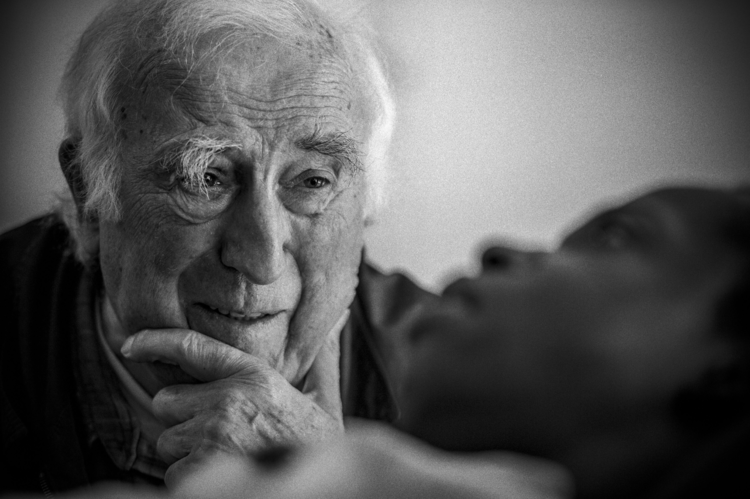|
My conversations with Jean Vanier raised many questions. I have no answers.
By John J. Conley
Lent began early this year. Several weeks ago, L’Arche International released a report detailing credible accusations of sexual abuse by Jean Vanier, the charismatic founder of the L’Arche communities and the Faith and Light movement, apostolates devoted to the service of and solidarity with people with intellectual disabilities. The accusations by six women, all of whom were adults and none of whom were disabled, followed a similar pattern. Facing difficulties in their lives, each had sought out Vanier as a spiritual director. Preying on their vulnerability, Mr. Vanier pressured each of them into sexual relations, claiming that these relations had a mystical justification. According to one woman, Mr. Vanier told her, “This is not us; this is Mary and Jesus. You are chosen, you are special.” Each woman was sworn to secrecy. Years later, the women are still wrestling with the brokenness and the disorientation wrought by Mr. Vanier’s actions. The revelations shocked a world that had revered Mr. Vanier as a moral hero, a prophet, perhaps a saint. They have devastated those of us who worked with L’Arche and Faith and Light and who knew Mr. Vanier as a personal friend. In 1977, I worked for several months as an assistant at Trosly-Breuil, the small French village where Mr. Vanier had founded the first L’Arche household. I lived in a community in which male and female assistants lived together with “core members” (people with intellectual disabilities). During the day I worked in a sheltered workshop. I have never lived in such an evangelical community. The ardent daily prayer, the simple but demanding work, the thousand daily tasks, the loving fellowship in the houses, and the daily practice of patience with the limits and wounds of us all—this was the Gospel of Jesus at its burning heart. When I first met Jean Vanier at Trosly, he was surprised to learn that I had actually read his doctoral dissertation on the concept of happiness in Aristotle. I explained how I had found the path to L’Arche through my sister Nancy, who had Down syndrome, and through the college summers I spent as a counselor at a day camp for children with disabilities. In subsequent conversations, Mr. Vanier would link happiness to solidarity with the wounded and neglected, a solidarity that gave us the courage to face our own fears and anguish. We spoke about the link between virtue and happiness in Aristotle, but Mr. Vanier would counter that suffering love, the heart of the Gospel, was foreign to the cool serenity of classical philosophy. How do we explain that some human beings seem to have no conscience? During my graduate philosophical studies at the Université catholique de Louvain in Belgium (1985-88), I served as the chaplain to the Faith and Light chapter at Louvain-la-Neuve. Each month, the members with disabilities and their families and friends would attend Mass, share a meal and have an afternoon activity (such as a biblical skit). During our annual pilgrimage to Lourdes, I ran into Jean Vanier walking toward the grotto. He smilingly asked, “What’s new with Aristotle these days?” I responded that there was a new debate about Aristotle’s concept of akrasia, the moral blindness that affects certain human beings. How do we explain that some human beings seem to have no conscience? Mr. Vanier remarked that some very intelligent people can have no empathy at all toward the suffering of others and that some people with grave intellectual disabilities can have a profound sense of right and wrong. As the news of Mr. Vanier’s transgressions crashed into the world of L’Arche and Faith and Light, I heard the voice of old Protestant friends, warning against the Catholic cult of the saints, too close to idolatry. God alone saves. A French friend cited Chateaubriand: “The human heart is always double.” Several correspondents cited St. Paul: “For all have sinned and fallen short of the glory of God.” We all sin, but we do not all engage in sexual abuse. This is all true, but it is a dangerous truism. We all sin, but we do not all engage in sexual abuse. And the blanket appeal to the sinfulness of the human condition can mask the spiritual abuse at the heart of this sexual transgression. The manipulation of spiritual vulnerability, even of the disciple’s love of Jesus and Mary, as a tool for sexual conquest lies at the center of Vanier’s assault against these women. These days I also hear the voice of Mr. Vanier the philosopher in our conversations. How could he see so clearly the need to respect the vulnerable and then abuse those under his spiritual care? How could he build a community that embodies Gospel love and then distort this religious love into psychological and physical duress? How could he see so clearly the akrasia of the aloof intellectual and then show such moral blindness in his own acts? I hear the philosophical voice of Mr. Vanier. I hear the anguished voices of the women he betrayed. The questions gnaw. I have no answer.
|
.
Any original material on these pages is copyright © BishopAccountability.org 2004. Reproduce freely with attribution.
